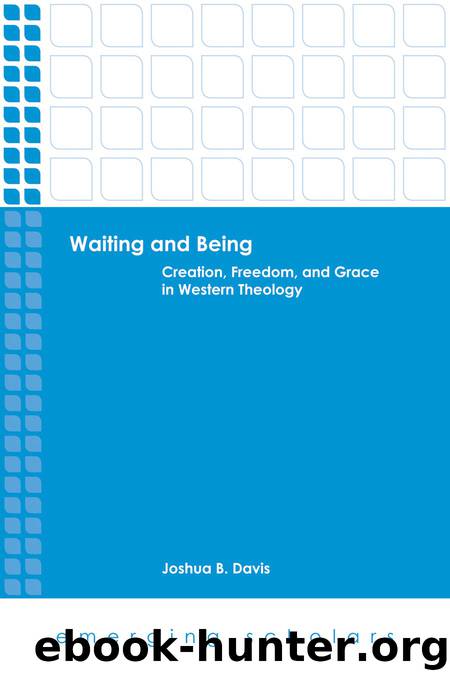Waiting and Being by Davis Joshua B

Author:Davis, Joshua B. [Joshua B. Davis]
Language: eng
Format: epub
ISBN: 978-1-4514-6522-8
Publisher: Fortress Press
Published: 2013-01-09T16:00:00+00:00
A Revealed Union: Concept, Sin, and Grace
As I noted in chapter 1, despite its emphasis on the extrinsic nature of grace, modern Protestant theology does not attempt, like Catholic neo-scholasticism, to evade transcendental subjectivity. Both Schleiermacher and Barth take Kant’s critique of metaphysics for granted and interpret the legacy of Protestant theology in its light. Their interpretation of grace in terms of practical, critical reason shows this debt to Kant. It results in an extrinsic concept of grace that does not set objectivity in opposition to transcendental subjectivity but presupposes their separation and understands grace as the critical concept that, when imposed on the experience of this separation, unifies them. This unity is not an immediate intuition of metaphysical identity but a critical concept of the social relation that rightly mediates the opposition. The “natural” experience of subjectivity is of a social relation that mediates only its estrangement from reality. Grace is the critical concept imposed on that experience, received from the self-communication of God in Jesus Christ, which exposes the illusion of that social relation. Election is the doctrine that articulates the truth of existence as it is known from faith, which adopts the critical standpoint of grace as the normative criterion for interpreting the subjective experience of separation from nature. In faith, which stands within the imposition of grace on the experience of separation, the subject knows that this grace, which critically reveals the sinful illusion of our estrangement from reality, is identical with the truth that the world is God’s creation. They are identical because they are different expressions of God’s single decree of election.
Schleiermacher and Barth share this concern to recast the classical Protestant doctrine of election into a single decree of election and reprobation, which is relevant to the modern concern with the separation of the subject and nature. The important decisive difference between them concerns whether that critical role is fulfilled by the Christian community or by Jesus Christ. Schleiermacher focused on the subject’s social relation to reality. All self-awareness is socially mediated, and an awareness shaped only by the immanence of “the world’s” relative contrasts will lead inevitably to the alienation the church calls “sin.” By contrast, the church’s language, culture, and practices of grace shape a selfhood with faith in the absolute contrast-without-contrast, an awareness of the fellowship with God that determines all experience prior to the separation from nature.[67] In that faith, the natural experience of separation is known generally as creation/preservation and specifically as grace/sin, both of which are united in their identity with the doctrine of election. Grace is extrinsic because it is socially and not naturally apprehended, but it is subjective because it discloses the truth of the self’s relation to nature.
Though he retains much of the form of Schleiermacher’s reconstruction of election, Barth believes his doctrine is too abstract. Just as all prior doctrines of election failed to recognize the implications of claiming that Jesus was the sole mediator of election, Schleiermacher also misconceives election in general rather than special terms.
Download
This site does not store any files on its server. We only index and link to content provided by other sites. Please contact the content providers to delete copyright contents if any and email us, we'll remove relevant links or contents immediately.
The Gnostic Gospels by Pagels Elaine(2531)
Jesus by Paul Johnson(2362)
Devil, The by Almond Philip C(2331)
The Nativity by Geza Vermes(2230)
The Psychedelic Gospels: The Secret History of Hallucinogens in Christianity by Jerry B. Brown(2157)
Forensics by Val McDermid(2094)
Going Clear: Scientology, Hollywood, and the Prison of Belief by Lawrence Wright(1985)
Going Clear by Lawrence Wright(1968)
Barking to the Choir by Gregory Boyle(1821)
Old Testament History by John H. Sailhamer(1814)
Augustine: Conversions to Confessions by Robin Lane Fox(1772)
The Early Centuries - Byzantium 01 by John Julius Norwich(1745)
A History of the Franks by Gregory of Tours(1728)
A Prophet with Honor by William C. Martin(1725)
Dark Mysteries of the Vatican by H. Paul Jeffers(1723)
The Bible Doesn't Say That by Dr. Joel M. Hoffman(1680)
by Christianity & Islam(1633)
The First Crusade by Thomas Asbridge(1610)
The Amish by Steven M. Nolt(1573)
